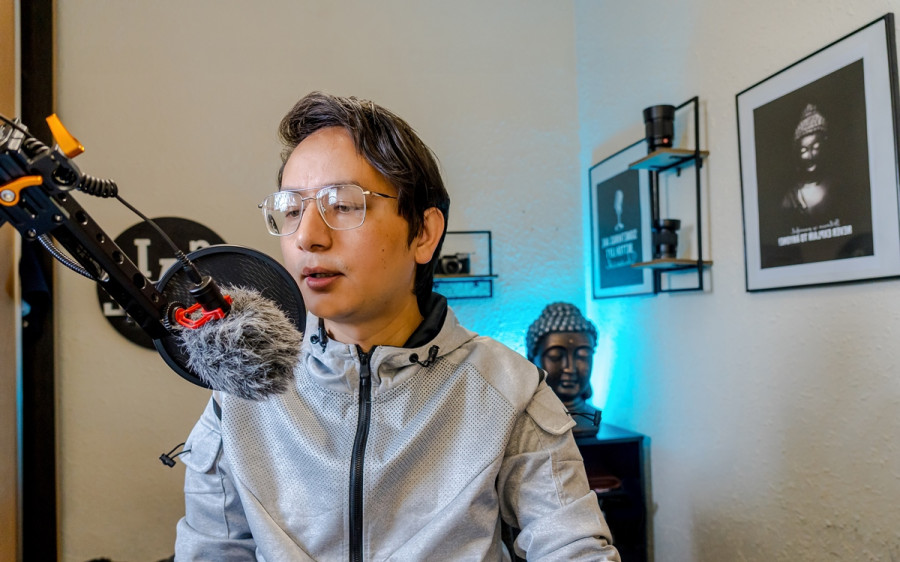Culture & Lifestyle
A quest to tell people’s stories
Last year, when Saigrace Pokharel uploaded a video on his Facebook page, he had no idea that it would turn him into a sought-after social media storyteller.
Srizu Bajracharya
Last year in April, when Saigrace Pokharel, on a whim, uploaded a video sharing his experience growing up in the 90s on his Facebook page, the video went viral. It was the first time Pokharel had received so much attention for his work in about a decade of storytelling.
“It was a huge surprise. The overwhelming response to my story got me thinking more about storytelling and how I was doing things,” Pokharel says to the Post in a recent Zoom conversation. “The experience completely changed how I looked at storytelling.”
If one goes back to that viral video to see what might have made it so popular, one will notice that it’s not just the timeless nostalgia the story’s topic evokes. It’s also the way Pokharel presents his story. The words in the story are carefully chosen to make listeners reflect on their childhood and the changes they have seen through the years.
Pokharel’s two-minute video feels like a spoken-word poetry recitation with semantics that encourages people to visualise themselves in the story.
“The 90s kids grew up experiencing both the old and the new ways. We spent the first few years of our lives without technology and then we saw the technological leap, which changed every aspect of our lives. In a way, we are sandwiched between two generations of thoughts,” he recounts in the recording in the Nepali language.
After the video went viral, things changed vastly for Pokharel, a social media content creator based in Barcelona, Spain. Today, he is known widely as an audio and video storyteller. Ever since last April, he has uploaded more than a hundred stories that mirror the reality and experiences of ordinary people. His stories mostly tap on human values and social issues.
“Stories have the power to stir things, and I have always wanted to create and tell stories that matter to people. And I feel like stories that touch on human values and cast light on the realities of our lives have lasting shelf lives. So my idea has always been to leave behind stories that people will always remember,” says Pokharel.
After completing his higher studies in 2016, Pokharel moved to Barcelona, Spain, where he runs his own company Saigrace Production, which provides social media marketing and media support consultancy to companies. Before moving abroad, Pokharel worked in the Nepal government’s Ministry of Health and Population's administrative department and also worked as a voiceover artist for various companies and brands.
But ever since his story went viral last year, he has focused on producing stories for social media platforms.
In one of his stories, ‘Khadi ko Katha’, he highlights the hardships of Nepali migrant workers in Qatar. Based on his own experiences, the story revolves around how Nepalis have contributed to building the country from the ground up. In the story, Pokharel recounts how he went exploring Qatar with a dear friend who works there. During his visit, Pokharel comes across a camel farm and meets a fellow Nepali, who moved to Qatar after failing to get good jobs in Nepal and now makes a living by working as a camel herder.
“There are just so many stories out there. But as a storyteller, I also try to tell stories of people who want their stories told,” says Pokharel.
His audience, he says, often writes to him saying his stories are very relatable.“When you learn that there are people out there who have experienced the same things as you have, you know that you aren’t alone. Stories can give people hope and comfort that other things in life can’t,” says Pokharel.
And that may be why Pokharel’s stories resonate with many people. And because of the fact that he uploads all his videos on YouTube, his stories have become accessible to Nepali audiences across the globe.
“I think podcasts would have been great, too, and I am already working on it. But when I was starting, I felt like YouTube, which is already very popular, would be easier for people to access,” says Pokharel.
For 33-year-old Pokharel, reading, listening, and telling stories have always been a significant part of his life. He remembers prodding his father to tell him stories and voraciously consuming comics and fantasy novels as a child.
And since he came from a very spiritually inclined family, stories were always an essential part of his learning years and served as a great way of discovering life paths.
“I was also greatly influenced by my time in Sri Sathya Sai Seva Organisation Nepal (a spiritual organisation), where I worked as a youth coordinator for different service programmes. It was there that I discovered that I had a knack for storytelling. I still remember the day I got up on the stage to give a speech on philosophy. People appreciated my delivery and presentation and that made me more serious about storytelling,” says Pokharel. “I loved weaving stories in my head. And I think I always understood the idea of how a story must be told. I often gathered my friends and families and shared my experiences and events as stories with them. I loved the attention I got.”
Pokharel says his family members and friends, who recognised his knack for storytelling, always encouraged him to do more of it. And now, with thousands of people following him on various social media platforms, Pokharel’s audience has expanded beyond his family and friends.
His YouTube page has over 300,000 subscribers, and he has more than 432,000 and 232,000 followers on Facebook and TikTok, respectively.
The pandemic is a factor that seems to have played a huge role in helping his videos gain traction. When he uploaded his video titled ‘90s kid’ in April last year, Nepal was in a strict lockdown. People had ample free time and were scouring the internet for content to consume. But what has allowed him to stay relevant and continue attracting viewers is the hard work he puts into every video he produces. As a storyteller, Pokharel also places a lot of emphasis on being ethical and responsible.
“When it comes to sensitive topics, I make sure that I protect my sources. You need to be responsible with your storytelling; without that kind of integrity, you lose the balance of what you are doing. I cannot just go and tell a story without conducting research and without thinking what the impact of the story will be,” he says.
Pokharel spends days coming up with story ideas. And he says he can’t help but look for stories all around. He is always thinking about his next story at the back of his mind, he says.
Every time he begins working on an idea, he starts with research and gathering facts, he says. When he is writing scripts, he makes sure that his characters are built with objectivity. “I don’t intend to tell people how you should punish someone if they have committed a crime, nor do I victimise a character or make villains out of characters as a plot device. I understand that many of the stories I tell need a different understanding and outlook of life, and I try my best to detach from the biases that I might have,” he says.
As his videos got more and more popular, Pokharel says many of his viewers have started sending him messages and emails and share with him their stories, hoping he would feature them on his channel.
“I try my best to tell different stories each time, and I see that many people who message me have some hope attached to their stories, and that’s why sometimes it’s challenging to decide what story I should work on. That takes a lot of sifting,” he says.
His popularity as a storyteller has also helped him be on the radar of Nepal-based brands and corporations looking for skilled storytellers to aid them in creating content for advertisements and promotions. He most recently collaborated with IME Limited, a remittance company.
“I now make a decent income, but that requires being tactful with decisions,” says Pokharel.
One of his most popular videos on YouTube is a love story based on his life, ‘Mero Adhuro Prem’ [My Incomplete Love], which has over three million views. The language he uses in his storytelling is simple but effective, and his sentences roll seamlessly. Pokharel is also working to bring it out as a novel in the future.
“Until a few years ago, people couldn’t imagine a career for social media storytellers and many didn’t really understand what storytelling is—they have always misunderstood it for narration,” says Pokharel. “But my works have made many realise the scope of storytelling and stories' ability to move people. I think that in itself is a feat. There are just so many stories I now want to bring to people. I want to live up to my dream of being a storyteller.”




 23.05°C Kathmandu
23.05°C Kathmandu















